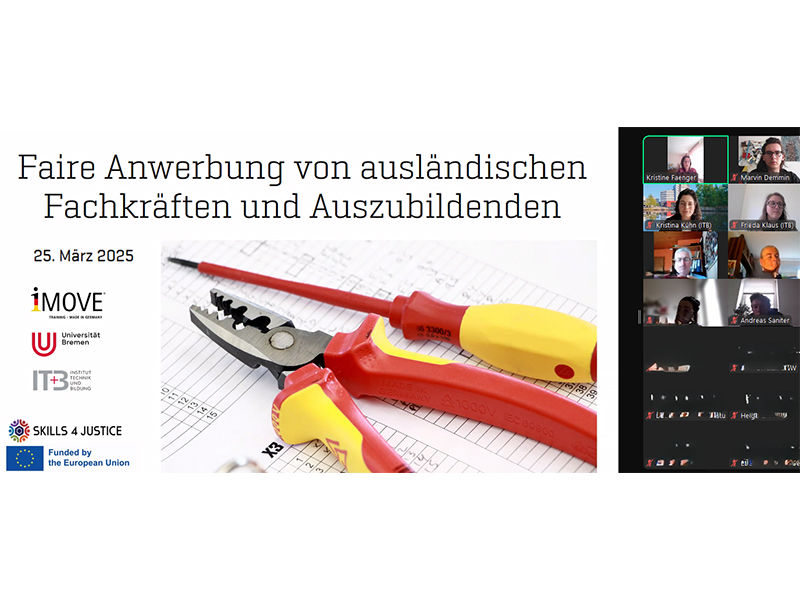SKILLS4JUSTICE is a research project funded by the HORIZON EUROPE programme.
iMOVE is an initiative of the Federal Ministry of Education and Research (BMBF) and part of the International Department at the Federal Institute for Vocational Education and Training (BIBB).
Dr Kristina Kühn and Frieda Klaus began by presenting initial research findings. In the introduction, selected figures on labour migration in Germany were presented and reasons given as to why the recruitment and employment of foreign skilled workers has so far been rather restrained. The presentation included various figures on labour migration and reasons why it is not as high as it could be. The main challenges include language barriers, the recognition of qualifications obtained abroad and bureaucratic hurdles. Key ‘pull factors’ have been identified for the sustainable retention of international skilled workers, including their protection and long-term integration, which requires fairness and sustainability as strategic guidelines.
Experience from 40 interviews with stakeholders from education, employer organisations and politics initially confirmed language and qualifications as the greatest challenges. Other barriers are the great responsibility for international skilled workers that German employers have to take on and the sustainable safeguarding of all processes that make sustainable recruitment and retention possible in the first place.
Despite these hurdles, there is an openness towards new target groups, such as trainees from non-EU countries. However, there is a lack of best practice examples and internal company structures to facilitate onboarding and organise recruitment sustainably. There is also a risk of ‘windy’ agencies, which should be counteracted at an early stage with internal contact points and employer branding.
Overall, the recruitment of international skilled workers is currently carried out primarily through projects or external agencies, while standardised processes are lacking. Although companies are aware of their integration responsibility, few resources are provided. Furthermore, there are only a few surveys on the integration and long-term retention of international skilled workers. Many companies are still in the decision-making phase regarding their international recruitment strategies and continue to have uncertainties and a need for support.
A key finding of the survey was that international specialists are currently recruited primarily via projects or external agencies, which is why standardised processes in HR management are often not yet visible. Although companies are aware of their responsibility for integration, hardly any resources are made available. Furthermore, there are only a few surveys on the integration and long-term retention of international specialists. Many companies are still in the decision-making phase with regard to their international recruitment strategies and still have uncertainties and a need for support.
These challenges and experiences were confirmed and constructively discussed by the participants.
The next online workshop is planned for the end of 2025. The focus will then be on labour migrants and their migration routes, experiences and opportunities for participation.
Links for further information can be found in the blue box.



